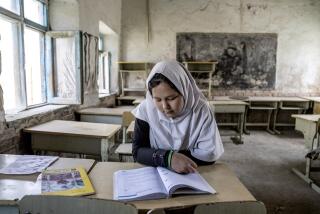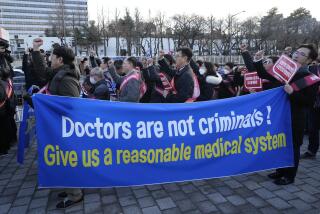Kabul Medical School Closed Amid Constitutional Debate
- Share via
KABUL, Afghanistan — When Anahita Hadi returned to Kabul from Pakistan last year, she was looking forward to finishing her medical studies and practicing in a country that is suffering from a severe shortage of skilled doctors.
She did not anticipate her government would prevent her.
Hadi, in her last year at the Kabul Medical Institute, is among 300 graduating students whose exams were canceled because the government said it needed the space on the campus for the loya jirga, which is debating the new constitution.
But students said the ministry of education feared that the medical school, a breeding ground for radicals, would riot during the debates. Even though officials deny that interpretation, the campus remains closed for renovations.
“This is not good, especially for the new generation. We want to be involved in our society and instead we were sacrificed by the loya jirga,” said Hadi, 25, who was looking forward to her residency. She added: “A lot of us are not doing anything, just staying at home. I have a job at the ministry of health, but what I want to do is serve the people.”
Many of the students will not return because they cannot afford to wait until March, when they have been told they can resume writing the tests. Some have drifted into jobs with nongovernmental organizations, others have returned to their homes in the provinces.
“I’m extremely sorry for the students,” said Farooq Wardak, director of the constitutional commission. “I fully understand their concerns. But for the sake of sustainable peace, for the future of Afghanistan, we -- all Afghans -- have to give some sacrifices.”
Wardak said the polytechnic campus was in rough shape and the $2.6-million renovation plan, which included the repair of the dormitories and cafeteria, would benefit the students in the long term. He said the fear of radical students causing problems was a “small element” in the decision.
“No, they were worried about protests,” said Aziza Syawash, 24, another graduating student. “There are lots of Taliban types in the school who live on the dormitories of the polytechnic, and the government was worried they would attack or disturb the loya jirga.”
The medical institute and the school of engineering, both part of Kabul University, have been hotbeds of extremism.
Najibullah, the former communist president who was hanged by the Taliban, was an alumnus of the medical school. The assassinated Northern Alliance leader Ahmed Shah Masoud graduated as an engineer, as did the renegade warlord Gulbuddin Hekmatyar, who is wanted by the United States.
Most of the school’s radical elements grew out of the nation’s wars, said Dr. Cheragh Ali, director of the Kabul Medical Institute. “All the people of Afghanistan want their children to become doctors,” he said. “So in the times of fighting, first when the moujahedeen succeeded, then the Taliban, they forced their young fighters and all their relatives on the school. So we had, and still have, all these people in the faculty.”
Ali has the unenviable task of depoliticizing the school, a difficult task when hundreds claim allegiance to the Taliban, the Northern Alliance’s Jamiat-i-Islami, or to the warlord Abdul Rashid Dostum.
“They are lazy students who are afraid of failing and want to disrupt the school. If we fail them, they demonstrate and protest. I don’t know what to do with them,” Ali said.
Syawash said attending school with radicalized students was part of the difficulty of adjusting to life in Kabul after 11 years in Peshawar. Her family returned mainly because the Afghan University’s medical college in Peshawar where she had been studying for five years was shut down.
“I didn’t want to move back to Kabul,” Syawash said. “In Peshawar, we had lots of facilities. Now we stand for the bus for one hour. In Peshawar the transport was good. There we had books, electricity and even Internet.
“Here, we women are struggling to find our place in our society,” she continued. “Today when we walk on the street men bother us, they shout at us and call us foreigners. There is nothing interesting to refresh our minds after studying. I wish we had good parks or good gardens.”
Hadi said she did not mind making a sacrifice for her country, but she was disillusioned with the loya jirga because it appeared that the moujahedeen elements were too strong.
“We are not optimistic for the loya jirga anymore,” she said. “The people in charge of the committees are fundamentalists. So how can this be a good process? I agree with Malalai Joya. She was a brave woman to stand up like that,” she said, referring to the delegate from Farah province who recently denounced the moujahedeen factions.
Syawash said that, despite the setbacks, she hoped to write her last two exams in March and get on with the business of providing medical help.
“We need proper hospitals. We cannot even find syringes and bandages inside our hospitals. I’ve seen people in the clinics sell needles in the bazaars because doctors don’t make good salaries. They only make $35 a month. And there are a lot of mental diseases because of the war. All the people of Afghanistan have some kind of mental illness.”
She paused for a moment. “Of course I will become a doctor and change all of this,” she said, “but I don’t know when.”
More to Read
Sign up for Essential California
The most important California stories and recommendations in your inbox every morning.
You may occasionally receive promotional content from the Los Angeles Times.













